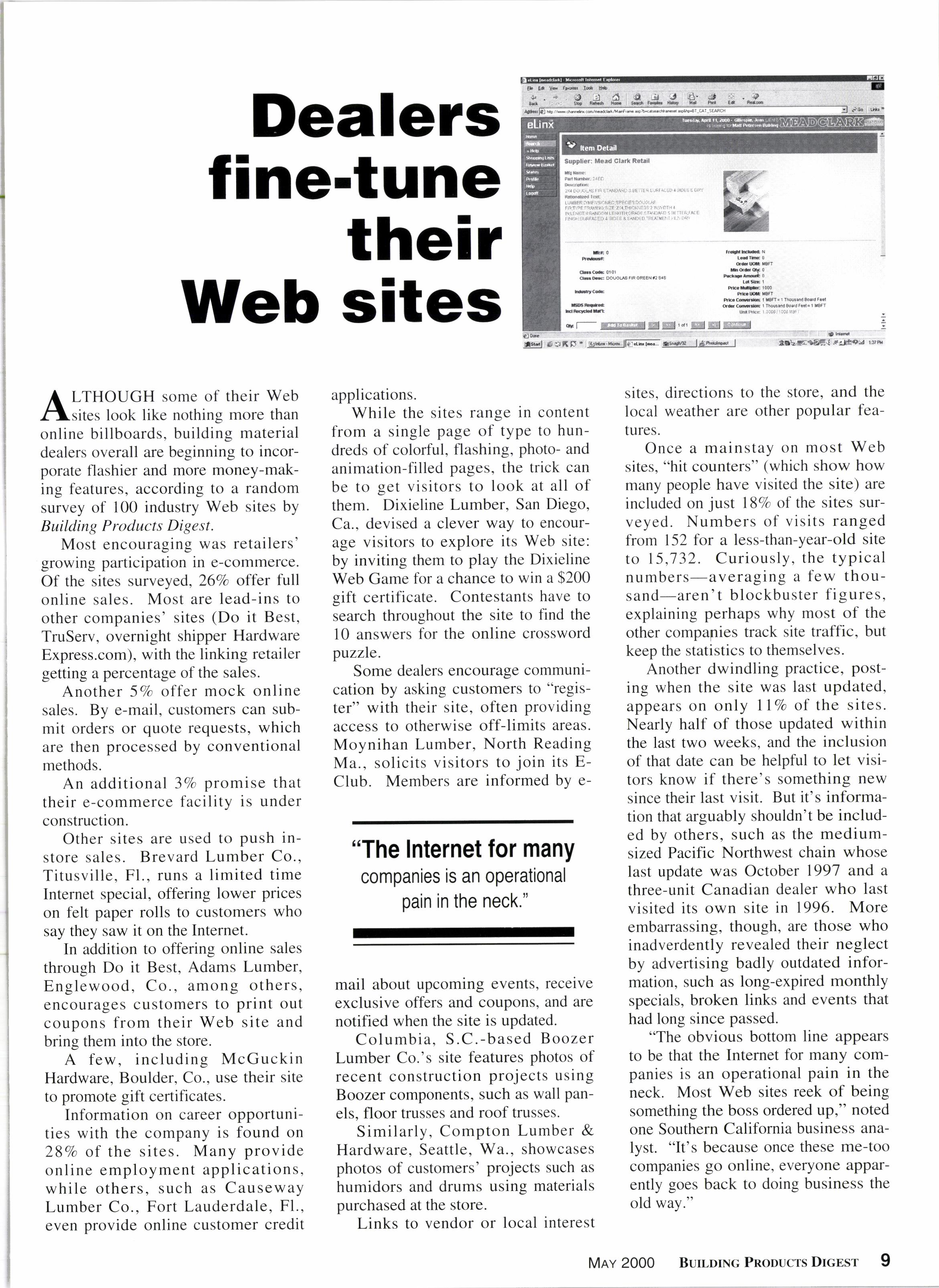
2 minute read
Dealers fine-tune their Web sites
A LTHOUGH some of their Web la,sites look Iike nothing more than online billboards, building material dealers overall are beginning to incorporate flashier and more money-making features, according to a random survey of 100 industry Web sites by Building P roducts Digest.
Most encouraging was retailers' growing participation in e-commerce. Of the sites surveyed, 267o offer full online sales. Most are lead-ins to other companies' sites (Do it Best, TruServ, overnight shipper Hardware Express.com), with the linking retailer getting a percentage ofthe sales.
Another 57o offer mock online sales. By e-mail, customers can submit orders or quote requests, which are then processed by conventional methods.
An additional 37o promise that their e-commerce facility is under construction.
Other sites are used to push instore sales. Brevard Lumber Co., Titusville. Fl.. runs a limited time Internet special, offering lower prices on felt paper rolls to customers who say they saw it on the Internet.
In addition to offering online sales through Do it Best, Adams Lumber, Englewood, Co., among others, encourages customers 10 print out coupons from their Web site and bring them into the store.
A few, including McGuckin Hardware, Boulder, Co., use their site to promote gift certificates.
Information on career opportunities with the company is found on 287a of the sites. Many provide online employment applications, while others, such as Causeway Lumber Co., Fort Lauderdale, Fl., even provide online customer credit applications.
While the sites range in content from a single page of type to hundreds of colorful, flashing, photo- and animation-filled pages, the trick can be to get visitors to look at all of them. Dixieline Lumber, San Diego, Ca., devised a clever way to encourage visitors to explore its Web site: by inviting them to play the Dixieline Web Game for a chance to win a $200 gift certificate. Contestants have to search throughout the site to find the 10 answers for the online crossword puzzle.
Some dealers encourage communication by asking customers to "register" with their site, often providing access to otherwise off-limits areas. Moynihan Lumber, North Reading Ma., solicits visitors to join its EClub. Members are informed by e- sites, local tures. mail about upcoming events, receive exclusive offers and coupons, and are notified when the site is updated.
Once a mainstay on most Web sites, "hit counters" (which show how many people have visited the site) are included on just lSVo of the sites surveyed. Numbers of visits ranged from 152 for a less-than-year-old site to 15,'732. Curiously, the typical numbers-averaging a few thousand-aren' t blockbuster figures, explaining perhaps why most of the other compapies track site traffic, but keep the statistics to themselves.
Columbia, S.C.-based Boozer Lumber Co.'s site features photos of recent construction projects using Boozer components, such as wall panels, floor trusses and roof trusses.
Similarly, Compton Lumber & Hardware, Seattle, Wa., showcases photos of customers' projects such as humidors and drums using materials purchased at the store.
Links to vendor or local interest
Another dwindling practice, posting when the site was last updated, appears on only ll%o of the sites. Nearly half of those updated within the last two weeks, and the inclusion of that date can be helpful to let visitors know if there's something new since their last visit. But it's information that arguably shouldn't be included by others, such as the mediumsized Pacific Northwest chain whose last update was October 1997 and a three-unit Canadian dealer who last visited its own site in 1996. More embarrassing, though, are those who inadverdently revealed their neglect by advertising badly outdated information, such as long-expired monthly specials, broken links and events that had long since passed.
"The obvious bottom line appears to be that the Internet for many companies is an operational pain in the neck. Most Web sites reek of being something the boss ordered up," noted one Southern California business analyst. "It's because once these me-too companies go online, everyone apparently goes back to doing business the old way."









